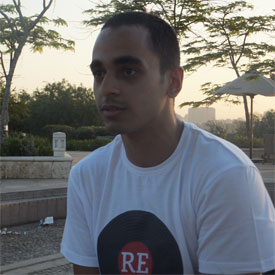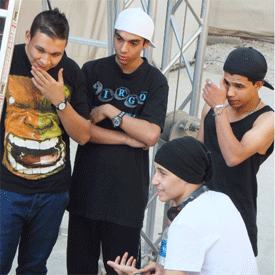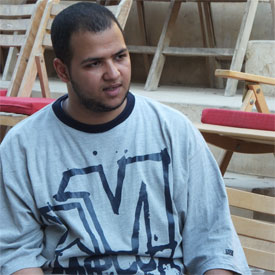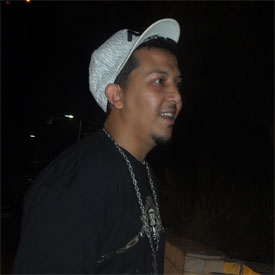On Thursday, 13 June, 100 Copies, a Cairo-based studio headed by Mahmoud Refaat, organised a concert for independent underground bands at El-Geneina Theatre in Al-Azhar Park. Under the banner "Retune Studio," the event was one in a series in which 100 Copies provides bands a platform to perform in Cairo venues.
Retune Studio aims at bringing to light underground musicians, giving them an opportunity for further development and exposure.
On 13 June, four of the 10 artists chosen by the studio played their music in a concert that mixed rap, hip hop vibes with electro music and shaabi (popular) beats, reflecting on different topics and issues. The line–up included Cellar Door, Kaboos Nation, Tahoon and MC Amin performing consecutively.
The evening began with Cellar Door, a one man project by Amr Al-Alamy, an information systems student who started in music four years ago.
Al-Alamy reveals that he grew up listening to various genres, like jazz, blues, dubstep, and hip-hop. However, his passion for electronic music was predominant, finding the music easy to create using only a laptop and software.
"It is easy for anyone to do, and it is up to the musician to fashion what he likes," Al-Alamy told Ahram Online, adding that he is trying to mix different influences together to generate new sounds.

Cellar Door (Photo: Enjy Adham)
Following performers took the evening into a mood dominated by rap.
The youngest in the evening's line-up was Kaboos Nation, a band of four formed in the local neighbourhood of Abdin in Cairo.
The band chose rap because it "helps to tailor words along the lines of daily life struggles." The band explained to Ahram Online that it "aims at bringing to the fore many emotions" that not only focus one's self, but also "deal with society, politics, and love."
The band tries to deliver several messages through their songs, using comedy or R&B vibes.
They expressed their appreciation for the Retune initiative, saying: "It is rare to see someone who supports bands that are not known to a wide audience, especially rap. Some of us have been singing for five years and nobody cared to shed light on us."

Kaboos Nation (Photo: Enjy Adham)
One of the Kaboos Nation's songs is La lel I'dam (No to Death Sentence), where the band collaborated with human rights groups, specifically the Andalus Institute for Tolerance and Anti-Violence Studies and Radio Horytna, projects in which they criticise as unmerciful the death sentence.
Other songs of Kaboos Nation have lyrics directly oppose the current ruling regime. "Rap is a Western trend. However, we try to discuss our problems and dreams not theirs," Fargaly, a member of Kaboos Nation, asserted.
After Kaboos Nation, a rising rapper, Tahoon, took the stage. Though influenced by Western rap, Tahoon feels comfortable in Arabic rap. Through this genre not only does he express his life experience, but asserts that rap allows him to put that experience "in a historical context."
Tahoon, a history graduate, was contacted by Refaat directly.
"When Retune was looking for artists, it had lots of musicians who were ready and well equipped. However, they wanted to feature artists that were not known to the scene at large," Tahoon told Ahram Online.

Tahoon (Photo: Enjy Adham)
"Everyone in the rap scene listens to the other's music. In order to get out of the circle, you have to produce new sounds," Tahoon continued.
Tahoon is old friends with Cellar Door's Amr Al-Alamy. They collaborated as Tahoon sang, mixing street talk with heavy lyrics using classical Arabic.
Having been in the scene for four years, Tahoon is looking forward to establishing a studio where he can make his own music and collaborate with others.
"I got into rap for the sake of rap. I am not expecting anything from this, as I am doing what I love," he said. His style is to mix Western music and shaabi tunes to produce something new and distinctive.
The heavyweight on the set was MC Amin, a prominent name in the rap underground scene in Egypt.
Starting his passion in Mansoura in 2004, where he formed Black Attack, a project that enabled him and his friends to organise rap battles and organising small shows, MC Amin came to Cairo where he formed Arab Rap Soldiers and Arab League Records, gathering other prominent names in the rap scene from the Arab world, with Arabic language as a common feature, including Arabian Knightz, Omar Offendum, Malikah, Narcicyst, Omar Boflot, Deeb and E-Money.

MC Amin (Photo: Enjy Adham)
Rap means a lot to MC Amin. He explained to Ahram Online: "It’s not only an art form; rap is the perfect tool to deliver a message and to empathise on certain topics — topics related to everyday life."
"We wanted to rap about our lives and our problems in a way that is different from the West, because each has a unique lifestyle," Amin continued.
Although Amin has released three albums, was hosted by MTV and MBC, and has performed abroad, he still considers himself an underground artist and has refused several offers that, according to him, would have interfered in his control over his songs, lyrics, style, and even his clothing.
Amin, as with Kaboos Nation and Tahoon, has radical and revolutionary rhetoric when addressing politics and daily life. When asked, the three artists asserted the importance in participating in the 30 June protests.
Kaboos Nation and MC Amin demonstrated their dissent when the latter played a follow up part in their song Morsi 'ala el Korsi (Morsi on the Throne), mimicking dialogue between a Morsi supporter and an opponent.
Amin had a considerable history with protest songs. In 2007, he released a track named El Wad' Lazem Yetghayar (Situation Needs to Change), calling for solidarity towards oppressed Arab countries. Amin mentioned that State Security had two reports written on him for similar songs.
The bands that played at the 100 Copties event continue to strive to record and produce tracks. Finding support is rare and limited. The initiative of 100 Copies and Retune Studio was praised by all who performed as being vital to spurring their musical careers.
Short link: